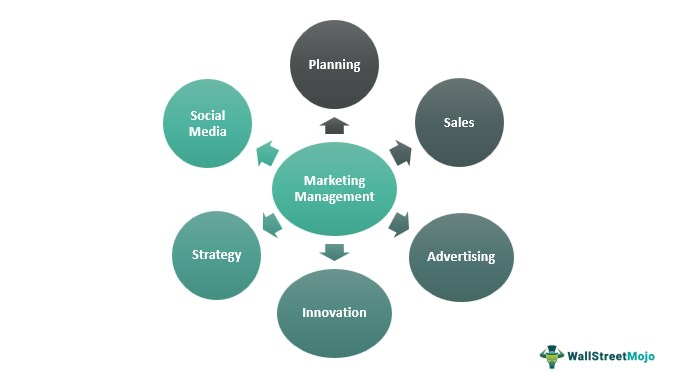Unlocking the Power of Marketing Management: Why It Matters
Marketing management plays a pivotal role in the success and growth of businesses in today’s dynamic and competitive landscape. It encompasses the strategic planning, implementation, and control of marketing activities aimed at achieving organizational objectives. By effectively managing the marketing function, businesses can gain a competitive edge, build strong brands, and foster long-term customer relationships.
In this article, we will explore the definition and overview of marketing management, highlighting its significance in driving business success. So, let’s dive in and unravel the world of marketing management.
Understanding Marketing Management
Marketing management plays a crucial role in driving the success of businesses in today’s competitive landscape. In this section, we will delve into the fundamentals of marketing management, exploring its definition, scope, key concepts, principles, and the role it plays in achieving organizational goals. Additionally, we will examine real-world case studies and examples to illustrate the impact of effective marketing management.
Definition and Scope of Marketing Management
Marketing management involves the strategic planning, implementation, and control of marketing activities to meet the objectives of an organization. It encompasses a range of activities, including market research, product development, pricing, promotion, distribution, and customer relationship management. The goal of marketing management is to create value for customers, build strong brands, and generate profitable customer relationships.
Key Concepts and Principles of Marketing Management
- Market Orientation: Marketing management emphasizes a customer-centric approach, focusing on understanding and meeting the needs of target customers. It involves conducting market research, analyzing consumer behavior, and adapting marketing strategies accordingly.
- The Marketing Mix (4 Ps): The marketing mix comprises four key elements that organizations utilize to influence customer perception and drive sales. These elements are product (creating and offering the right product or service), price (setting an appropriate price that reflects value), place (ensuring products are available in the right locations), and promotion (communicating the value proposition to the target audience).
- Segmentation, Targeting, and Positioning: Effective marketing management involves segmenting the market based on factors such as demographics, psychographics, and behavior, identifying target segments, and positioning products or services to meet the specific needs and preferences of those segments.
- Customer Relationship Management (CRM): Marketing management focuses on building and nurturing long-term customer relationships. CRM strategies involve understanding customer preferences, delivering personalized experiences, and fostering customer loyalty.
- Integrated Marketing Communication (IMC): IMC involves the coordination and integration of various marketing communication channels, such as advertising, public relations, direct marketing, and digital marketing, to deliver a consistent and impactful message to the target audience.

The Role of Marketing Management in Achieving Organizational Goals
Marketing management plays a critical role in driving the achievement of organizational goals. Here’s how it contributes:
- Revenue Generation: By identifying customer needs and wants, creating compelling value propositions, and effectively promoting products or services, marketing management helps drive sales and revenue growth.
- Market Expansion: Through market research and strategic planning, marketing management identifies opportunities to enter new markets, expand customer reach, and diversify the customer base.
- Brand Building and Differentiation: Marketing management establishes and maintains a strong brand identity, positioning the organization as unique and superior to competitors. This enhances brand equity and customer loyalty.
- Customer Satisfaction and Retention: Marketing management focuses on understanding customer expectations and delivering exceptional experiences. By providing value and addressing customer needs, it fosters satisfaction and promotes long-term relationships.
The Importance of Marketing Management
Marketing management plays a crucial role in the success of businesses across various industries. By employing effective marketing strategies and techniques, organizations can achieve a wide range of objectives and drive sustainable growth. This section will delve into the importance of marketing management by exploring its impact on customer satisfaction, brand awareness, sales growth, market expansion, customer relationships, adaptation to market trends, return on investment, and overcoming challenges. Additionally, real-world success stories will be highlighted to illustrate the significance of marketing management in practice.
1. Enhancing Customer Satisfaction and Loyalty through Marketing Management
Marketing management is essential for understanding customers’ needs, preferences, and expectations. By conducting market research, analyzing consumer behavior, and identifying target markets, organizations can tailor their products or services to meet customer demands effectively. This customer-centric approach enhances customer satisfaction and builds loyalty, leading to repeat business and positive word-of-mouth referrals. For example, companies like Apple and Amazon have consistently focused on delivering exceptional customer experiences, resulting in a dedicated customer base and strong brand loyalty.
2. Creating Brand Awareness and Differentiation
Marketing management plays a pivotal role in creating brand awareness and establishing a unique brand identity. Through strategic branding initiatives, organizations can differentiate themselves from competitors, capture consumers’ attention, and build brand recognition. Effective marketing management ensures that the brand message is effectively communicated to the target audience through various channels, such as advertising, social media, content marketing, and public relations. A notable example is the brand Nike, which has successfully positioned itself as a symbol of inspiration, empowerment, and athletic excellence through its powerful marketing campaigns and endorsements.
3. Driving Sales and Revenue Growth
One of the primary objectives of marketing management is to drive sales and revenue growth. By developing effective marketing strategies, organizations can reach their target audience, generate leads, and convert them into paying customers. Through targeted promotional activities, pricing strategies, and distribution channels, marketing management ensures that products or services are effectively positioned in the market to maximize sales. For instance, the global fast-food chain McDonald’s has consistently employed marketing management techniques to drive sales growth and expand its customer base.
4. Expanding Market Reach and Penetration
Marketing management is instrumental in expanding a company’s market reach and penetration. By identifying new market opportunities, developing market entry strategies, and implementing effective marketing campaigns, organizations can enter new geographic regions or target new customer segments. This expansion allows businesses to tap into untapped markets, increase market share, and diversify their customer base. A prominent example is the global ride-hailing platform Uber, which successfully expanded its services to numerous cities and countries worldwide through its strategic marketing efforts.
5. Building Long-Term Relationships with Customers
Marketing management emphasizes the importance of building long-term relationships with customers. By focusing on customer retention and loyalty, organizations can establish a loyal customer base that generates recurring revenue. Through personalized communication, customer engagement initiatives, and loyalty programs, marketing management fosters ongoing relationships with customers, resulting in repeat purchases and positive customer advocacy. An exemplary case is the coffeehouse chain Starbucks, which has cultivated a strong community of loyal customers by prioritizing personalized customer experiences and creating a welcoming ambiance.
6. Adapting to Changing Market Trends and Dynamics
In today’s rapidly evolving business landscape, organizations must stay agile and adapt to changing market trends and dynamics. Marketing management plays a critical role in monitoring market trends, analyzing consumer behavior, and identifying emerging opportunities or threats. By staying abreast of market changes, organizations can proactively adjust their marketing strategies, product offerings, and communication channels to meet evolving customer needs. A notable example is the fashion retailer Zara, which has built a reputation for its fast-fashion model that responds quickly to emerging fashion trends, thereby catering to evolving consumer preferences.
7. Maximizing Marketing ROI (Return on Investment)
Marketing management involves allocating resources effectively to maximize the return on marketing investments. By analyzing marketing metrics, conducting cost-benefit analyses, and measuring campaign effectiveness, organizations can optimize their marketing efforts to generate the highest possible return on investment. Marketing management ensures that marketing activities are aligned with the company’s goals and objectives, resulting in efficient resource allocation and improved financial performance. For instance, Procter & Gamble has a strong focus on data-driven marketing strategies, allowing them to optimize their marketing spend and achieve substantial returns.
8. Mitigating Risks and Overcoming Challenges through Effective Marketing Management
Marketing management enables organizations to navigate risks and overcome challenges in the dynamic business environment. Through comprehensive market research, competitor analysis, and risk assessment, marketing management helps identify potential obstacles and develop strategies to mitigate them. By monitoring market trends and consumer feedback, organizations can anticipate shifts in customer preferences or industry dynamics and proactively respond to them. A notable example is Netflix, which disrupted the traditional video rental industry by recognizing the shift in consumer behavior toward online streaming and adapting its business model accordingly.
Real-World Success Stories Highlighting the Importance of Marketing Management
Numerous real-world success stories underscore the critical role of marketing management in achieving business objectives and driving success. For instance:
- Red Bull: Through innovative marketing strategies, Red Bull positioned itself as an energy drink synonymous with extreme sports and adventure. The brand’s targeted marketing campaigns, event sponsorships, and content creation efforts resulted in substantial brand awareness and a dedicated customer base.
- Airbnb: By leveraging effective marketing management techniques, Airbnb disrupted the hospitality industry by offering unique travel experiences. Through compelling storytelling, social media engagement, and experiential marketing campaigns, Airbnb built a global brand and achieved remarkable growth.
- Tesla: Tesla revolutionized the electric vehicle industry through its marketing management strategies. By creating a luxury brand image, leveraging social media, and capitalizing on the unique features of its electric cars, Tesla successfully differentiated itself and attracted a passionate customer base.
These success stories exemplify how effective marketing management, encompassing strategic planning, innovative campaigns, and customer-centric approaches, can drive significant business outcomes and reshape entire industries.
Marketing management plays a vital role in business success by enhancing customer satisfaction, creating brand awareness, driving sales growth, expanding market reach, building customer relationships, adapting to market trends, maximizing marketing ROI, and overcoming challenges. Real-world success stories demonstrate how organizations have leveraged effective marketing management strategies to achieve remarkable results and gain a competitive edge in their respective markets. Embracing and implementing sound marketing management practices is crucial for businesses aiming to thrive and grow in today’s dynamic business landscape.
Strategies and Techniques in Marketing Management

Marketing management involves the strategic development and implementation of marketing efforts to achieve organizational objectives. This section explores various strategies and techniques employed in marketing management, including developing comprehensive marketing plans, conducting market research and analysis, target market identification and segmentation, product development and pricing strategies, promotional and advertising campaigns, distribution and channel management, brand management and positioning, measuring and analyzing marketing performance, and the integration of technology and digital marketing.
1. Developing Comprehensive Marketing Plans
One of the core activities in marketing management is developing comprehensive marketing plans. These plans outline the marketing goals, objectives, strategies, and tactics that guide the organization’s marketing activities. They provide a roadmap for achieving desired outcomes, such as increasing market share, launching new products, or entering new markets. Effective marketing plans consider factors such as target audience, competition, budget allocation, and timelines. They serve as a framework for decision-making and help ensure that marketing efforts are aligned with the organization’s overall strategic objectives.
2. Conducting Market Research and Analysis
Market research and analysis are vital components of marketing management. Through market research, organizations gather data and insights about the target market, customers, competitors, and industry trends. This information helps in understanding customer needs, preferences, and behavior, identifying market opportunities, and assessing competitive dynamics. Market analysis involves analyzing and interpreting the collected data to derive meaningful conclusions and make informed marketing decisions. Techniques such as surveys, focus groups, customer interviews, and data analytics are commonly employed in market research and analysis.
3. Target Market Identification and Segmentation
Target market identification and segmentation involve dividing the broader market into distinct segments based on similar characteristics, needs, or preferences. By identifying the target market, organizations can tailor their marketing strategies and messages to effectively reach and engage specific customer groups. Market segmentation enables organizations to understand different customer segments’ distinct requirements and develop customized marketing approaches. Segmentation variables may include demographic factors, psychographic traits, geographic location, or behavioral patterns.
4. Product Development and Pricing Strategies
Marketing management encompasses product development and pricing strategies. Product development involves the creation or enhancement of products or services to meet customer needs and preferences. Marketing managers work closely with product development teams to ensure that new offerings align with market demand and competitive trends. Pricing strategies involve determining the optimal price points for products or services based on factors such as production costs, value proposition, customer perceptions, and competitive pricing. Effective pricing strategies aim to maximize profitability while remaining competitive in the market.
5. Promotional and Advertising Campaigns
Promotional and advertising campaigns are crucial elements of marketing management. These campaigns aim to create awareness, generate interest, and stimulate demand for products or services. Marketing managers develop strategic communication plans that leverage various channels, including traditional advertising, digital marketing, social media, content marketing, public relations, and events. The campaigns are designed to effectively convey the brand message, engage the target audience, and drive customer actions, such as making a purchase or visiting a store.
6. Distribution and Channel Management
Distribution and channel management refer to the activities involved in making products or services available to customers. Marketing managers strategize on the most effective distribution channels to reach target markets efficiently. This may involve selecting and managing distribution partners, such as wholesalers, retailers, or online marketplaces. Effective channel management ensures that products or services are distributed in a timely manner, reach the intended customers, and maintain optimal availability and visibility in the market.
7. Brand Management and Positioning
Brand management and positioning are key aspects of marketing management. Marketing managers develop and nurture brands to create a distinct identity, build customer loyalty, and differentiate the organization from competitors. Brand management involves defining the brand’s attributes, values, and personality, as well as developing brand strategies and guidelines for consistent brand representation across various touchpoints. Positioning refers to the perception and positioning of the brand in the minds of consumers relative to competitors. Effective brand management and positioning are essential for establishing strong brand equity and achieving long-term success.
8. Measuring and Analyzing Marketing Performance
Measuring and analyzing marketing performance is crucial to evaluate the effectiveness and impact of marketing efforts. Marketing managers employ various metrics, key performance indicators (KPIs), and analytics tools to assess the success of marketing campaigns, track customer engagement, and measure return on investment. These insights help in refining marketing strategies, identifying areas for improvement, and making data-driven decisions. Marketing performance measurement also facilitates accountability and enables the allocation of resources to the most effective marketing activities.
9. Integration of Technology and Digital Marketing
The integration of technology and digital marketing has transformed the landscape of marketing management. Digital marketing encompasses a wide range of activities, including search engine optimization (SEO), social media marketing, content marketing, email marketing, mobile marketing, and data analytics. Marketing managers leverage digital platforms, tools, and technologies to reach a broader audience, engage customers, and gather real-time insights. The integration of technology enables personalized marketing experiences, targeted advertising, marketing automation, and enhanced customer relationship management.
Marketing management involves various strategies and techniques to drive organizational success. These include developing comprehensive marketing plans, conducting market research and analysis, target market identification and segmentation, product development and pricing strategies, promotional and advertising campaigns, distribution and channel management, brand management and positioning, measuring and analyzing marketing performance, and integrating technology and digital marketing. Effective implementation of these strategies and techniques enables organizations to adapt to market dynamics, meet customer needs, and achieve their marketing objectives in an increasingly digital and competitive business environment.
Building Effective Marketing Management Skills

Marketing management requires a diverse set of skills and competencies to successfully drive marketing initiatives and achieve organizational goals. This section explores key skills and competencies required for successful marketing management, strategies for enhancing marketing management skills, professional certifications and educational programs, learning from industry experts and mentors, and the importance of continuous learning and staying updated with industry trends.
1. Key Skills and Competencies for Successful Marketing Management
To excel in marketing management, individuals need to possess a combination of technical, analytical, creative, and interpersonal skills. Here are some key skills and competencies that are essential for effective marketing management:
a) Strategic Thinking: Marketing managers must have a strategic mindset to develop long-term plans, set goals, and make informed decisions that align with the organization’s overall objectives.
b) Market Research and Analysis: Proficiency in conducting market research, analyzing data, and gaining insights about the target market, customers, and competitors is crucial for making informed marketing decisions.
c) Digital Marketing: In today’s digital age, understanding digital marketing channels, techniques, and tools is vital. This includes knowledge of search engine optimization (SEO), social media marketing, content marketing, email marketing, and data analytics.
d) Creativity and Innovation: Marketing managers need to think creatively to develop compelling marketing campaigns, create engaging content, and differentiate their brand from competitors.
e) Communication and Influencing Skills: Strong verbal and written communication skills are essential for effectively conveying marketing messages, collaborating with cross-functional teams, and influencing stakeholders.
f) Analytical and Data-driven Approach: The ability to interpret and analyze marketing data, metrics, and key performance indicators (KPIs) enables marketing managers to measure the effectiveness of campaigns, identify areas for improvement, and optimize marketing strategies.
g) Project Management: Marketing managers often oversee multiple projects simultaneously. Proficiency in project management skills, such as planning, organizing, and coordinating tasks, ensures the successful execution of marketing initiatives.
h) Customer-centric Mindset: Understanding customer needs, preferences, and behavior is crucial for developing targeted marketing strategies and delivering exceptional customer experiences.
2. Strategies for Enhancing Marketing Management Skills
To enhance marketing management skills, consider the following strategies:
a) Continuous Learning: Stay updated with the latest industry trends, best practices, and emerging technologies through books, online articles, industry publications, and reputable marketing blogs. Engage in lifelong learning to broaden your knowledge and stay ahead in a rapidly evolving field.
b) Online Courses and Certifications: Enroll in online courses and certification programs specifically tailored to marketing management. Platforms like Coursera, LinkedIn Learning, and HubSpot Academy offer a wide range of courses covering various aspects of marketing, including strategic marketing management, digital marketing, data analytics, and customer relationship management (CRM).
c) Industry Events and Conferences: Attend marketing conferences, workshops, and industry events to gain insights from industry experts, learn about innovative marketing strategies, and network with professionals in the field. These events provide valuable opportunities to stay updated with the latest trends and exchange ideas with like-minded individuals.
d) Peer Learning and Collaboration: Join professional marketing associations or online communities to connect with fellow marketing professionals. Engage in discussions, share experiences, and learn from each other’s successes and challenges. Collaborating with peers can broaden your perspectives and provide valuable insights into different marketing strategies and approaches.
e) Seek Mentors and Industry Experts: Identify experienced marketing professionals or industry experts who can serve as mentors. Their guidance and expertise can provide invaluable insights, help you navigate challenges, and accelerate your learning and growth in marketing management.
3. Professional Certifications and Educational Programs
Obtaining professional certifications and completing educational programs in marketing management can enhance your credentials and demonstrate your expertise in the field. Consider the following certifications and programs:
a) American Marketing Association (AMA) Professional Certifications: The AMA offers a range of professional certifications, such as Professional Certified Marketer (PCM) and Digital Marketing Certification. These certifications validate your knowledge and skills in specific areas of marketing.
b) HubSpot Inbound Marketing Certification: This certification program covers inbound marketing methodology, content marketing, social media promotion, email marketing, and lead nurturing. It demonstrates proficiency in inbound marketing strategies and techniques.
c) Google Ads Certifications: Google offers certifications for various Google Ads specializations, including Search, Display, Video, Shopping, and Measurement. These certifications validate your knowledge of Google Ads and digital advertising strategies.
d) MBA or Master’s Degree in Marketing: Pursuing an advanced degree, such as an MBA with a specialization in marketing or a master’s degree in marketing, can provide comprehensive knowledge and an in-depth understanding of marketing principles, strategy formulation, consumer behavior, and market analysis.
4. Learning from Industry Experts and Mentors
Learning from industry experts and mentors can significantly contribute to your professional growth in marketing management. Seek opportunities to connect with experienced professionals through networking events, industry associations, or mentorship programs. Engage in conversations, ask for advice, and learn from their experiences and perspectives. Their guidance can provide valuable insights, practical knowledge, and industry-specific expertise.
5. Continuous Learning and Staying Updated with Industry Trends
Marketing is a dynamic field that constantly evolves with new technologies, consumer behaviors, and market trends.
Case Studies: Impact of Effective Marketing Management
Effective marketing management can have a profound impact on businesses, driving growth, customer engagement, and overall success. Let’s explore a few case studies that highlight the positive outcomes achieved through strategic marketing management.
Case Study 1: Nike’s “Just Do It” Campaign

Nike, a global leader in athletic footwear and apparel, is renowned for its impactful marketing campaigns. One of their most iconic campaigns is the “Just Do It” campaign, which was launched in 1988. The campaign aimed to inspire and motivate individuals to pursue their athletic goals, regardless of their abilities or limitations.
Through effective marketing management, Nike successfully positioned itself as a brand that empowers and supports athletes. The campaign resonated with consumers, resulting in increased brand awareness, customer loyalty, and ultimately, higher sales. Nike’s marketing management team strategically crafted the campaign’s messaging, leveraging emotional appeal and aspirational storytelling to connect with its target audience.
Case Study 2: Coca-Cola’s Share a Coke Campaign

Coca-Cola’s “Share a Coke” campaign, launched in 2011, is another excellent example of effective marketing management. The campaign aimed to create a personalized and emotional connection with consumers by replacing the Coca-Cola logo on bottles with popular names and terms.
Through extensive market research and consumer insights, Coca-Cola identified the desire for personalization among its target audience. By printing individual names on the bottles, the campaign encouraged people to share Coca-Cola with their loved ones and created a sense of belonging and connection. The campaign generated significant social media buzz, with people sharing images of personalized bottles, leading to increased brand engagement and sales.
Case Study 3: Airbnb’s Experiential Marketing

Airbnb, a leading online marketplace for accommodations, utilizes experiential marketing to create memorable and immersive experiences for its customers. One notable campaign was the “Night At” series, where Airbnb transformed unique spaces like the Louvre Museum and the Great Wall of China into exclusive overnight stays for lucky contest winners.
Through innovative marketing management strategies, Airbnb created a buzz around the brand, positioning itself as a company that offers extraordinary and unforgettable travel experiences. These campaigns generated widespread media coverage, social media buzz, and increased brand visibility, ultimately leading to a boost in bookings and user engagement.
Case Study 4: Dove’s Real Beauty Campaign

Dove’s “Real Beauty” campaign is a prime example of marketing management that focused on promoting inclusivity and challenging conventional beauty standards. The campaign aimed to empower women by celebrating diverse body types, ages, and ethnicities, in contrast to the idealized portrayals of beauty commonly seen in the media.
Through this campaign, Dove successfully connected with its target audience on a deeper emotional level. The marketing management team developed thought-provoking advertisements, featuring real women and encouraging viewers to embrace their unique beauty. The campaign garnered widespread acclaim, resonating with consumers and enhancing Dove’s brand image as a champion of authenticity and self-acceptance.
These case studies demonstrate the impact of effective marketing management in driving brand awareness, customer engagement, and business growth. By understanding their target audience, crafting compelling messaging, and implementing innovative marketing strategies, these companies achieved remarkable success in their respective markets. Through strategic planning, implementation, and analysis, marketing management played a pivotal role in driving these positive outcomes.
Conclusion
Marketing management is the driving force behind business success, fueling revenue generation, brand strength, and customer understanding. By strategically planning, implementing, and analyzing marketing efforts, businesses can increase brand awareness, boost revenue, and cultivate customer loyalty. The cohesive direction provided by marketing management aligns campaigns with organizational goals, while marketing managers serve as liaisons, utilizing research to understand consumer needs and desires. Continuous learning and adaptation are key to thriving in the ever-evolving marketing landscape. Marketing management not only impacts individual businesses but also drives competition, innovation, and economic growth.
By prioritizing marketing management and staying updated with industry trends, businesses can seize opportunities, differentiate themselves, and achieve sustainable growth. Embrace the customer-centric approach and equip yourself with the skills needed to excel in marketing management. Together, we can thrive in today’s dynamic and competitive marketplace.

